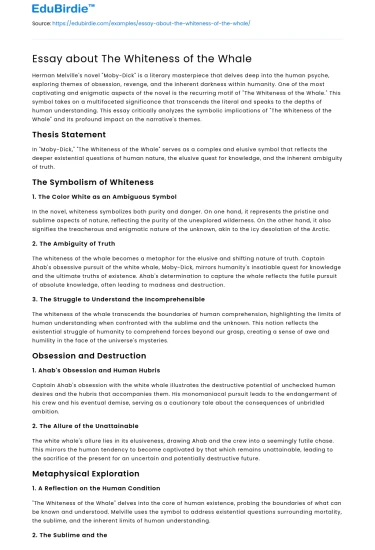Herman Melville's novel "Moby-Dick" is a literary masterpiece that delves deep into the human psyche, exploring themes of obsession, revenge, and the inherent darkness within humanity. One of the most captivating and enigmatic aspects of the novel is the recurring motif of "The Whiteness of the Whale." This symbol takes on a multifaceted significance that transcends the literal and speaks to the depths of human understanding. This essay critically analyzes the symbolic implications of "The Whiteness of the Whale" and its profound impact on the narrative's themes.
Thesis Statement
In "Moby-Dick," "The Whiteness of the Whale" serves as a complex and elusive symbol that reflects the deeper existential questions of human nature, the elusive quest for knowledge, and the inherent ambiguity of truth.
Save your time!
We can take care of your essay
- Proper editing and formatting
- Free revision, title page, and bibliography
- Flexible prices and money-back guarantee
The Symbolism of Whiteness
1. The Color White as an Ambiguous Symbol
In the novel, whiteness symbolizes both purity and danger. On one hand, it represents the pristine and sublime aspects of nature, reflecting the purity of the unexplored wilderness. On the other hand, it also signifies the treacherous and enigmatic nature of the unknown, akin to the icy desolation of the Arctic.
2. The Ambiguity of Truth
The whiteness of the whale becomes a metaphor for the elusive and shifting nature of truth. Captain Ahab's obsessive pursuit of the white whale, Moby-Dick, mirrors humanity's insatiable quest for knowledge and the ultimate truths of existence. Ahab's determination to capture the whale reflects the futile pursuit of absolute knowledge, often leading to madness and destruction.
3. The Struggle to Understand the Incomprehensible
The whiteness of the whale transcends the boundaries of human comprehension, highlighting the limits of human understanding when confronted with the sublime and the unknown. This notion reflects the existential struggle of humanity to comprehend forces beyond our grasp, creating a sense of awe and humility in the face of the universe's mysteries.
Obsession and Destruction
1. Ahab's Obsession and Human Hubris
Captain Ahab's obsession with the white whale illustrates the destructive potential of unchecked human desires and the hubris that accompanies them. His monomaniacal pursuit leads to the endangerment of his crew and his eventual demise, serving as a cautionary tale about the consequences of unbridled ambition.
2. The Allure of the Unattainable
The white whale's allure lies in its elusiveness, drawing Ahab and the crew into a seemingly futile chase. This mirrors the human tendency to become captivated by that which remains unattainable, leading to the sacrifice of the present for an uncertain and potentially destructive future.
Metaphysical Exploration
1. A Reflection on the Human Condition
"The Whiteness of the Whale" delves into the core of human existence, probing the boundaries of what can be known and understood. Melville uses the symbol to address existential questions surrounding mortality, the sublime, and the inherent limits of human understanding.
2. The Sublime and the Uncanny
Whiteness also embodies the sublime, a concept that transcends human understanding and induces a mix of awe and terror. The uncanny quality of the whale's whiteness evokes both fascination and unease, reflecting the complexity of the human experience when confronted with the unknown.
Conclusion: The Elusive Depths of Symbolism
In conclusion, "The Whiteness of the Whale" in Herman Melville's "Moby-Dick" is a symbol that operates on multiple levels, representing the enigmatic nature of truth, the destructive force of obsession, and the inherent ambiguity of human understanding. This symbol encapsulates the complexity of the novel's themes, addressing humanity's existential questions, the pursuit of knowledge, and the allure of the unknown. Through the elusive and shifting nature of whiteness, Melville invites readers to explore the depths of human nature, the mysteries of existence, and the ever-present tension between knowledge and ignorance. The whiteness of the whale remains an enduring symbol that speaks to the profound complexities of the human experience.






 Stuck on your essay?
Stuck on your essay?

